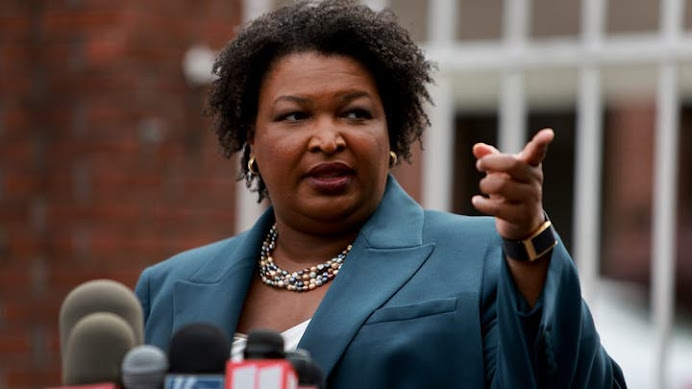Stacey Abrams on Fox News on arguments that legal abortion results in the loss of too many "Black lives that matter": "I think that's a very specious argument that's used to cloak what is I think a deeply disturbing approach to this conversation."
Georgia's Democratic gubernatorial nominee Stacey Abrams on Sunday refused to say whether she believed there should be restrictions on abortions or whether she believed abortion was acceptable all the way up to nine months, saying it is a "medical decision" and shouldn't be political.
Abrams was pressed during a "Fox News Sunday" interview to respond to the Supreme Court ruling overturning Roe v. Wade on Friday and whether she believed there should be any limitations on abortion.
"I believe that abortion is a medical decision. And I believe that that should be a choice made between a doctor and a woman and in consultation with her family," Abrams said. "But I think the challenge that we have is that we keep putting this in a political space. This is a medical decision. And the medical choices that should be made should be governed by what is best for that woman. And what is the best suggestion of an advice of their doctor."
Later in the interview, "Fox News Sunday" anchor Martha MacCallum asked Abrams about the lives and safety of the child, prompting Abrams to criticize Republican Georgia Gov. Brian Kemp, claiming he has "refused to expand Medicaid in the state of Georgia."
"He has refused to support women at every stage of their lives when they are trying to make the best choices for themselves and their families," Abrams said. "And the reality is, if we care about the medical, if we care about the medical needs of women, especially black women then we have to care the entire time."
MacCallum followed up to rephrase her initial question about whether Abrams supports abortion up to 9 months and asked at what point does Abrams start to care about the life of the baby.
"What I would say is that it is a medical decision. I don't know of a single woman who reaches the stage where this decision is easy. That is not the case. And so this is a medical conversation. And while we are absolutely compelled to have these difficult conversations, they should not be political ones," Abrams said.
"I should not be making decisions without having true understanding of the facts. Nor should any other political leader," the Georgia Democrat continued. "This is not a political issue. This is a medical issue."
When pressed on whether Abrams was saying that abortion should be allowed up to 9 months depending on the woman, the Georgia Democrat said, "That is not what I said."
"I said this is a medical decision. And the medical decisions that have to be made have to be made in context. This is a specious approach to try to denude the entire argument and the reality is abortion and reproductive care is personal and it is singular and it should be made between a woman and her doctor," Abrams concluded. "I do not have either the experience or the capacity to know what is happening with others."
Abrams also appeared on CNN's "State of the Union" Sunday and was asked whether she believes that businesses should pull operations from Georgia if an abortion ban goes into effect.


